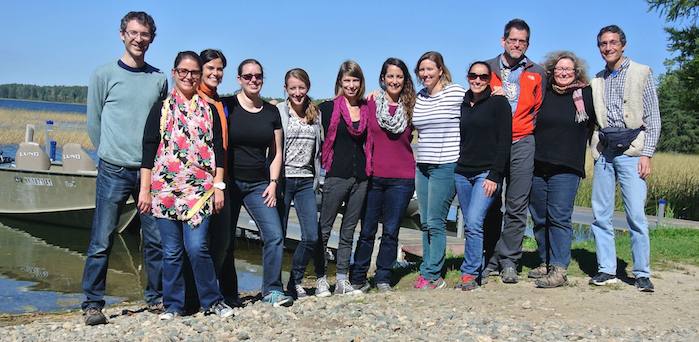Research News
Biodiversity stabilizes ecosystems during climate extremes
A study led by Forest Isbell (EEB/Cedar Creek) published in the online edition Nature, based on data collected at 46 grasslands in North America and Europe, demonstrates that Increasing plant diversity decreases the extent to which extremely wet or dry conditions disrupt grassland productivity. go to study
Related:
- Why restoring nature could be the key to fighting climate change [Time | October 14, 2015]
- Biodiversity stabilizes ecosystems during climate extremes [UMNews | October 14, 2015]
- Biodiversity stabilizes climate [MNDaily | October 27, 2015]
The role of host genetic variation in shaping the composition of the human microbiome
Ran Blekhman (GCD/EEB) and colleagues analyzed the composition of the human microbiome and host genetic variation for a study, published in Genome Biology, which found significant associations between host genetic variation and microbiome composition driven by host genetic variation in immunity-related pathways. go to study
Related:
- Who Is The Master Of Your Microbial Domain? [Popular Science | September 23, 2015]
- Genetics, Immunity, and the Microbiome [The Scientist | September 16, 2015]
Vines add surprising variable to tropical forest carbon storage
Jennifer Powers (EEB) and colleagues recently published a study in the Proceedings of the National Academy of Sciences that shows lianas, a type of woody vine, dramatically reduce carbon sequestration by crowding out and killing trees. go to study
Related:
- Vines smother forests' ability to store carbon, study finds [The Austrailian | October 13, 2015]
- Study quantifies Liana Vines' threat to forests [New York Times | October 12, 2015]
- Vines add surprising variable to tropical forest carbon storage [UMNews | October 12, 2015]
Half of lion populations lost in key regions of Africa
A new study co-authored by Craig Packer (EEB) shows that lion populations in much of Africa are in rapid decline. Published in Proceedings of the National Academy of Sciences, the study estimates that lion numbers in West and Central Africa are declining sharply and are projected to decline a further 50 percent in the next two decades without a major conservation effort. go to study
Related:
- Lion population in Africa likely to fall by half, study finds [New York Times | October 26, 2015]
- East, West Africa could lose 50% of their lions by 2035 [Science | October 26, 2015]
- A conversation with field biologist Craig Packer on the lives of lions [MPR | October 12, 2015]
Nutrient makeup of individual plant species dependent on biotic context
A new study led by Elizabeth Borer (EEB) and colleagues is featured in a special issue of the Journal of Ecology on how plants affect biogeochemical cycling. The study focuses on the degree to which foliar stoichiometry of grassland plants changes within individual species growing in communities of differing plant species richness and food-web compositio,n and the role of food-web complexity in controlling foliar stoichiometry. U of M researchers David Tilman, Eric Seabloom, Rebecca Montgomery, Linda Kinkel, Eric Lind and Eric Ogdahl are co-authors. go to study
Research Collaborations
Jennifer Powers is PI for a new Department of Energy-funded effort to describe how belowground processes mediate the response of seasonally dry tropical forests carbon dynamics to environmental change. Powers and colleagues from the University of Minnesota, Princeton and Oak Ridge National Lab will partner with collaborators who manage existing networks of data-rich forests in Costa Rica, Mexico, Puerto Rico and Colombia to conduct field observations across a range of dry forest sites, manipulative experiments, and model simulations that quantify sensitivity of ecosystem carbon cycling to external forces.

Funding Opportunities
- The University of Minnesota’s Water Resources Center is accepting research proposals through November 16 for projects that address agricultural impacts on water quality. more
- The Institute on the Environment is accepting proposals through November 30 for Renewable Development Fund grants of up to $250,000 for research related to the generation of renewable electricity in Minnesota. more